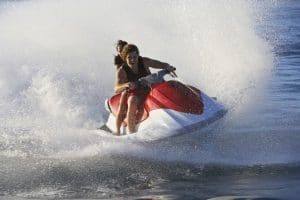Watercraft Accidents in Oklahoma City
 Oklahoma is a beautiful state, known for its wonderful lakes, rivers, and other bodies of water, like Lake Hefner and Arcadia Lake or the Oklahoma River. These waterways are great for boating, canoeing, and having fun with jet skis, water skis, flyboards, and hoverboards.
Oklahoma is a beautiful state, known for its wonderful lakes, rivers, and other bodies of water, like Lake Hefner and Arcadia Lake or the Oklahoma River. These waterways are great for boating, canoeing, and having fun with jet skis, water skis, flyboards, and hoverboards.
In summer, these waterways are a great way to have fun and enjoy the season. Most waterways of any size are used for both commercial and recreational purposes. There are risks, though. Every type of watercraft can lead to serious or even fatal injuries. Many watercraft accidents happen due to negligence. Product defects may also cause fatalities and trips to the emergency room.
What are the common types of accidents involving boats, jet skis, and other types of watercraft?
Some of the ways that boating and other watercraft accidents happen include:
- Collisions between two watercraft vehicles
- Collisions between watercraft and swimmers
- Collisions between watercraft and stationary objects (like docks)
- Falls from boats, jet skis, and other vessels
- Falls from hoverboards and jet packs
- Vessels capsizing and/or sinking
- Watercraft fires caused by defective parts
- Carbon monoxide poisoning (motor-powered watercraft only)
- The watercraft fails to function properly due to a defective part
- The boat or watercraft sinks
What rules govern boating vessels?
According to Boat US Foundation, there are many different rules that apply to operating any watercraft. There are different rules for international vs. inland waters, and for operating on Great Lakes (as opposed to other lakes) as well as on western rivers. There are also different rules depending on the type of vessel, such as:
- Vessels that are power-driven (motorized)
- Sailing vessels (motorized and non-motorized)
- Fishing vessels
- Seaplanes
- Vessels that must follow a specific course
- Vessels that are “restricted in their ability to maneuver”
- A vessel that is not under someone’s command
There are rules for operating when visibility is reduced due to mist, rain, fog, or other weather-related reasons. Generally, non-commercial boating activities should be restricted in bad weather and when it’s dark outside. There are rules for who has the right of way when vessels meet and when a vessel can overtake another boat.
In addition to federal rules and general boating practice guidelines, the entities – such as the state of Oklahoma that controls the lakes, rivers, and other waterways – may have their own set of operational rules.
According to USCG Boating, in Oklahoma, you must be 12 or older to operate a motorized vessel or a personal watercraft, with limited exceptions. Anyone between 12 and 16 must complete a course so they can receive a Boater Education Card and must be supervised by adults according to specific conditions. Anyone 16 or older is encouraged to obtain a Boating Education Card.
Why do boating, jet ski, and other watercraft accidents happen?
Most accidents in the water are due to the negligence or recklessness of the operator of the boat, canoe, kayak, ski, or other watercraft. Common reasons for this negligence and recklessness include:
- Failure to comply with the rules for operating the watercraft. Anyone who operates their boat, skis, or other watercraft too fast for conditions, too close to swimmers, or weaves back and forth when other watercraft are nearby should be held accountable for any harm they cause.
- Failure to be obtain training on how to operate a boat, waterski, hoverboard, or any watercraft device. While many of these devices may seem simple to use, users should make sure they take educational courses to understand the dangers and how to respond to emergencies.
- Not having the proper protective gear. Boats and watercraft should be equipped with lifesavers and safety jackets, buckets for bailing water, oars or paddles, and cellphones among other safety equipment.
- Operating while under the influence of alcohol or drugs. Boating is dangerous. There’s no excuse for having a few beers while you’re navigating the Oklahoma waters.
- Permitting someone who isn’t licensed to operate a boat if a license is required.
- Distracted boating, jet skiing, etc.
How a defective part can lead to an accident on the water
In some cases, accidents may be caused by defective parts. Perhaps the propeller has a defect, or there is faulty writing in the jet pack that makes it stop working while the user is 10 feet up in the air. Defective fabrication can cause watercraft to capsize and sink, and electrical issues can lead to fires. If you sustain injuries related to a defective part, you can file a product liability claim against the manufacturer, distributor, and/or retailer of your vessel or product.
What are examples of serious boating injuries?
- Limb loss and crush injuries. Anyone struck by a propeller or another boat may suffer a crush injury or limb loss. They will likely have severe cuts and bruises even if they manage to keep their limbs. They may suffer internal injuries.
- Head and spinal trauma. Collision victims may suffer spinal cord damage, traumatic brain injuries, or neck and back injuries. They can also be knocked overboard.
- Burn injuries. If a vessel catches fire, the people aboard it and around it may suffer serious burn injuries.
- Drowning is always a distinct possibility. People on speedboats and jet skis may hit the water especially hard, leading to catastrophic injuries as a result. Jet packs can also cause serious injuries if the user is very high off the water. Victims may fall when the boat, skis, or other devices are near loading docks or land.
- CO poisoning. Carbon monoxide is an odorless, invisible gas, and inhaling too much of it can quickly lead to CO poisoning. CO poisoning can lead to brain damage or death.
At Cunningham & Mears, our Oklahoma City boating and personal watercraft lawyers understand which courts handle wrongful death and personal injury claims in waterway accidents. We file claims against the boat operators, boat owners, manufacturers, and any other responsible parties. We demand compensation for all your injuries including your pain and suffering, medical bills, and lost income. To speak with a respected trial lawyer with a reputation for strong settlements and verdicts, call our seasoned Oklahoma City lawyers at 405.232.1212 or fill out our contact form to schedule an appointment.

Ryan Y. Cunningham is a founding partner of Cunningham & Mears. Mr. Cunningham devotes his practice to protecting the rights of injured Oklahoma residents. In addition to assisting injured clients, Mr. Cunningham endeavors to improve personal injury representation by speaking on issues related to personal injury law to attorneys in continuing legal education courses and to law students. Learn More
